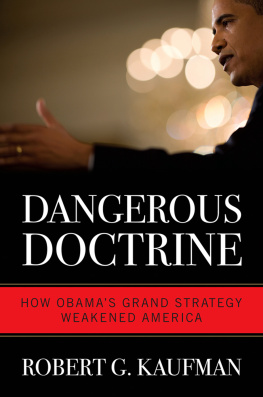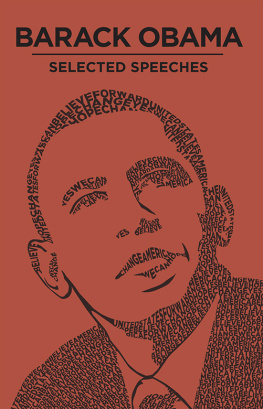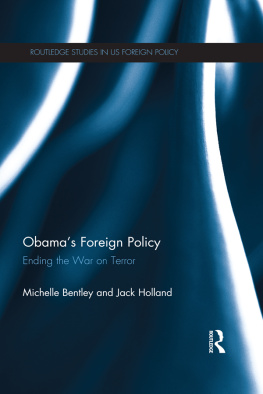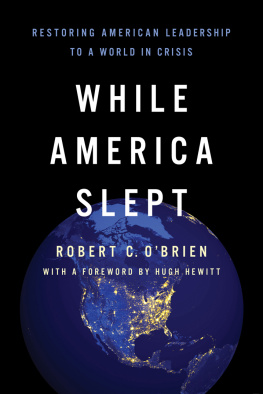
Dangerous Doctrine
DANGEROUS DOCTRINE
HOW OBAMAS GRAND STRATEGY WEAKENED AMERICA
ROBERT G. KAUFMAN

Due to variations in the technical specifications of different electronic reading devices, some elements of this ebook may not appear as they do in the print edition. Readers are encouraged to experiment with user settings for optimum results.
Copyright 2016 by The University Press of Kentucky
Scholarly publisher for the Commonwealth,
serving Bellarmine University, Berea College, Centre College of Kentucky, Eastern Kentucky University, The Filson Historical Society, Georgetown College, Kentucky Historical Society, Kentucky State University, Morehead State University, Murray State University, Northern Kentucky University, Transylvania University, University of Kentucky, University of Louisville, and Western Kentucky University.
All rights reserved.
Editorial and Sales Offices: The University Press of Kentucky
663 South Limestone Street, Lexington, Kentucky 40508-4008
www.kentuckypress.com
Cataloging-in-Publication data is available from the Library of Congress.
ISBN 978-0-8131-6720-6 (hardcover : alk. paper)
ISBN 978-0-8131-6721-3 (pdf)
ISBN 978-0-8131-6722-0 (epub)
This book is printed on acid-free paper meeting the requirements of the American National Standard for Permanence in Paper for Printed Library Materials.

Manufactured in the United States of America.
 | Member of the Association of
American University Presses |
To the memory of Susannah Merry Hansona wonderful young woman who led a wonderful life that sudden illness ended much too soon. Suzy was not only one of my favorite students but also one of my favorite people. I will always remember and admire Suzy for the sterling content of her character, her indefatigable good humor, and her unpretentious but formidable intelligence.
December 31, 1986November 13, 2014
Contents
Introduction
Is there an Obama Doctrine, a distinct grand strategy informing the presidents foreign and national security policies?1 Or does the search for coherence confuse rather than clarify understanding? Opinions vary. Some prominent defenders of the administration not only deny the existence of the Obama Doctrine, but also praise the president for choosing pragmatism and flexibility as an alternative.2 In a January 2014 interview with David Remnick, President Obama responded in the same vein, saying there was no need for any new grand strategy: I dont really even need George Kennan right now, said the president, only the right strategic partners.3 Conversely, some of Obamas fiercest detractors assail him for lacking sufficient interest in foreign policy to define or adhere to any core strategy.4 Neither of these perspectives is correct. Nor does it suffice to summarize the Obama Doctrine as Dont Do Stupid Stuff (Thomas Friedmans formulation in the New York Times), or simply as a policy of American retrenchment.5
Like Margaret Thatcher and Ronald Reagan, President Obama came to office as a conviction rather than consensus politician. Obama aspires to transform not only the relationship between government and the individual at home, but also the role of the United States abroad. As Walter Russell Mead observes, the president has extremely ambitious foreign policy goals: a global climate treaty; a new relationship with Iran; nuclear arms control and disarmament; the withdrawal of American military forces from Iraq and Afghanistan without leaving chaos behind; a final settlement of the Arab-Israeli conflict; the containment of global terrorism; engagement with Russia; a benign end to the Syrian civil war; a decent outcome for the Arab Spring; a durable equilibrium in East Asia with a rising China embracing rather than menacing the regional status quo; American military restraint, except in extraordinary circumstances that require a high burden of proof to justify the resort to unilateralism of narrow coalitions of the willing; and the establishment of multilateralism, collective security, and international law as the norm for resolving international disputes.6
President Obama has articulated a clear, consistent national security strategy, which has crystallized into a doctrine during his second term. The president has pursued his transformative agenda with remarkable fidelity, despite the vagaries of practical politics compelling even the most consistent conviction politicians to compromise frequently.
This book will explicate and analyze the Obama Doctrine, drawing primarily, though not exclusively, from President Obamas own rationale for his policies. It will spotlight the period from his inauguration through the midterm elections of 2014. The author consciously avoids any reliance on incendiary accounts of President Obamas foreign policy that routinely place the worst possible construction on the presidents motives without adequate empirical foundation.7 For all the divergence of perspectives on the merits of President Obamas foreign policy, consensus exists that the president has dominated its formulation and implementation. This includes Obamas first term, when occasional differences occurred within his administration; Secretary of State Hillary Clinton was consistently the most hawkish member during internal debates.8 As William Galston observes in the Wall Street Journal, Clinton vigorously advocated the surge in Afghanistan, the use of American airpower in Libya in 2011, and the Navy Seal raid killing Osama bin Laden. She unsuccessfully supported maintaining a residual American force in Iraq, a proposal that the presidents manifest lack of enthusiasm for and the public opposition of the Iraqi government conspired to doom. Although she endorsed negotiating with Iran, Clinton also distrusted Iranian intentionsfar more than the president did. President Obama prevailed handily, however, in all the major foreign policy battles within the administration while Hillary Clinton served as secretary of state.9 Robert Gates and Leon Panetta (who served as Obamas first director of the CIA and then replaced Gates as secretary of defense) both complained in their memoirs about the Obama administrations zealous determination to bring everything under their control.10
Obama has asserted his prerogative even more decisively during his second term, appointing Chuck Hagel as secretary of defense, John Kerry as secretary of state, and Samantha Power as his ambassador to the United Nations. This trio has embraced President Obamas view of the world and the diminished role for American military power in it with even fewer reservations than their predecessors, who challenged the president on rare occasions within quite narrow bounds.11 Consider, for example, the symbiotic political relationship between Obama and John Kerry. Like Obama, Kerry stridently opposed every one of Ronald Reagans pivotal foreign policy initiativesthe defense buildup, SDI, the U.S. military intervention in Grenada, and his uncompromising and relentless anticommunist rhetoric. Like Obama, Kerry passionately advocated the nuclear freeze as a preferable alternative. After initially voting for the invasion of Iraq in 2003, Kerry repented, coming out categorically against the war, the Bush Doctrine, and Bushs 2007 surge. Kerrys days as an antiwar leader in Vietnam also instilled in him strong presumptionmatching Obamasfor deferring and limiting the use of force in favor of multilateralism, engagement, and diplomacy.12
Next page









